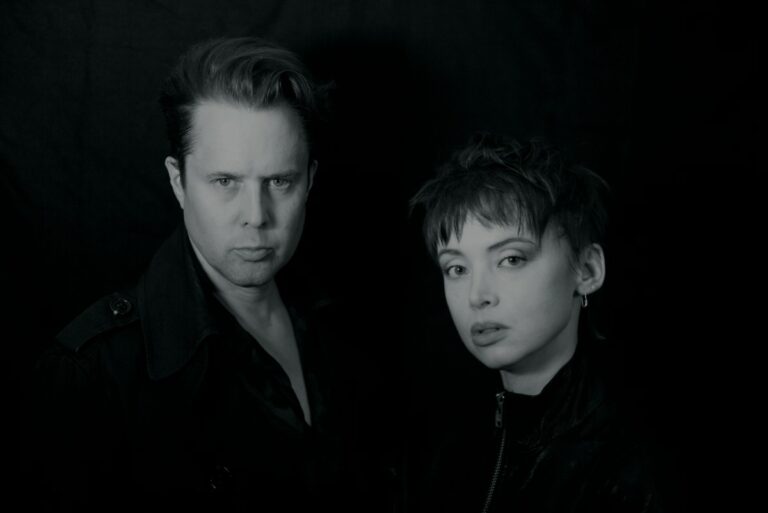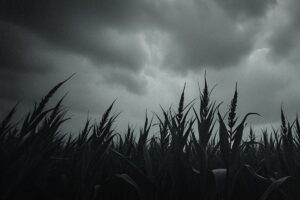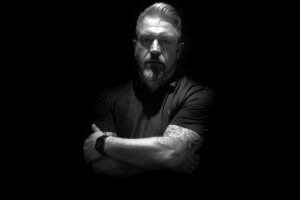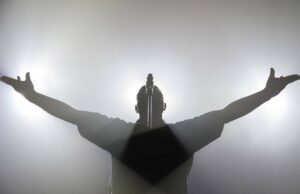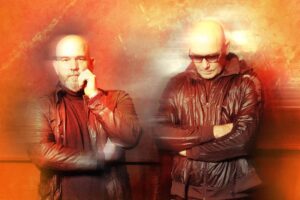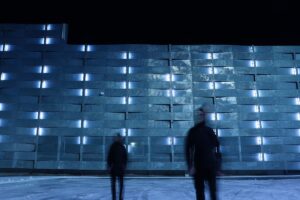New York-based duo Ghost Cop has been steadily building an underground following with their unique blend of cinematic soundscapes and dystopian dance beats. The project, comprised of Lucy Swope and Sean Dack, released their debut album, One Weird Trick, in 2018.
Ghost Cop’s second album, Trouble, arrives on October 4. They’ve already released an advance single called “Problems” that showcases their signature mix of sonic tension and haunting vocals.
With Trouble on the way, I reached out to Lucy and Sean to learn more about the album, their influences, and what listeners can expect. Here’s what they told me.
Trouble is your sophomore album. Though you’ve released a handful of singles and of course the End Credits EP. How has your sound evolved since One Weird Trick?
Sean: One Weird Trick was us finding our sound and sometimes overshooting a bit in terms of arrangement and ideas. Overall OWT is quite varied and sometimes experimental. That allowed us to pare things back a bit over the course of the subsequent releases and really figure out what works for our sound.
What new elements are you incorporating?
Sean: Arrangement-wise we wanted to focus on some core sonics and even reuse some sounds from previous releases to create a bit of a GHOST COP signature palette. Coming after End Credits we realized we could implement soundtrack type elements into song-based structures and do so in a way that didn’t feel overbearing or need visuals to tell the complete story.
Trouble feels like a tight and concise collection of songs with no filler. If End Credits was a score to an imaginary movie, Trouble would be a soundtrack collection of songs for a film. To get to this tightly curated set of eight songs we wrote probably over 30 demos in various permutations and states in which most didn’t make the cut. However, a decent amount of these songs will see the light of day in an upcoming audio visual project debuting before the end of the year called Trouble TV.
You’ve said that Trouble explores themes of mental illness and depression. Why those topics?
Lucy: Well, they say “write what you know.” Much on this album is inspired by my own experiences and feelings. In the past, I’ve generally written about concepts or ideas at a bit of a remove to insulate and protect myself, but all the art I love takes risks to be weird, vulnerable, authentic. I decided maybe I should make myself a little uncomfortable and give it a go.
Is there a particular message or feeling you hope listeners take away?
Lucy: There’s no particular agenda here. I don’t approach art to be moralizing or instructive, but I would say that if people recognize a part of themselves in anything that I’m talking about, then maybe that will help them feel not so alone.
Sometimes I joke that we make “feel-bad dance music,” but there’s a reason why we pair heavy lyrics with upbeat rhythms, “the medium is the message” and all that. I might write songs about feeling bad, but I don’t want YOU to feel bad. If you’ve got demons, let them out to dance.
Is there a particular song on Trouble that resonates the most personally with either of you?
Lucy: “Suitable Way of Living” is special to me. We started writing that one back in 2019, and the chorus was locked in almost immediately, but the verses went through many rewrites. We even played it live in various different iterations for almost a year, and it never worked.
This is the point at which, if I haven’t already, I would give up on a song completely. Generally, the more you tinker, the worse you make it, and if I’m not having fun with it as an artist, I don’t think the audience is going to have fun with it, either.
So we put it on the backburner but couldn’t totally abandon it because there was that chorus we loved so much. Then just a few months ago, Sean made some tweaks to the instrumentation and had an idea for a verse melody, and the rest of the song just poured out of me in a few hours. I really love the whole thing now, it’s exactly the song it should be and I’m so happy we gave it the time it needed.
And then on the exact opposite end of the spectrum, there’s “The Girl With the Terminal Stare,” which I love for its simplicity. I think that was done in a day, and I love how it feels unencumbered.
Sean, which tracks are your favorites?
Sean: I am also super happy with how “Suitable Way” turned out. Sometimes songs just have to sit and find their own path and catch back up to you when you’re ready to work on them.
We focused a lot on arrangement and structure for this LP, and I learned a lot during that time. “Suitable Way” needed that knowledge and fresh ears to come to fruition with a bit of stripping back in the arrangement for maximum dynamics when the chorus hits . I think it’s one of the best songs on the LP and the perfect opener to side two.
However, my favorite song currently is “Petition,” the closing song. I always like the songs we do that expand on what GHOST COP can be and I love how that one turned out. It’s the perfect October song.
Your music evokes moods that are often haunting and unsettling. What mood do you want listeners to experience with Trouble?
Lucy: Haunted and unsettled kind of hits the nail on the head. Maybe also intrigued, apprehensive, curious. What’s behind that closed door?
Ghost Cop is heavily influenced by horror and cult films. Were there any particular movies or filmmakers that inspired you while making Trouble?
Lucy: For my part, this album was very influenced by House of Psychotic Women, both the book by Kier-La Janisse, and the sub-genre of film the phrase has come to describe. The approach in that book of using film as a modality to understand and express yourself and your experiences unlocked something in my writing.
Some of the films that inspired me: Censor, The Whip and the Body, Death Game, The Forbidden Photos of a Lady Above Suspicion, Near Dark, The Witch Who Came From the Sea, I Like Bats, and the films of Jean Rollins
Sean: I love when watching a 1970’s or 1980’s cult or low-budget horror movie you can tell the person tasked with writing the score had probably one analog synth and maybe an organ and a few effects boxes and made it work with very little equipment. And you can hear the simplicity of that and how they really stretched out what the equipment was capable of. For reverb sounds I wanted to use a lot of lo-fi spring reverbs and stay away from glossy digital sounds. That reminds me of those types of soundtracks but also gives things a bit of a punky/dubby feel.
As far as recent films go, Censor was the best thing I’ve seen in ages, but also the 4K remaster of Susperia with remastered audio was absolutely bonkers.
You recently had to cancel some shows in Texas and Arizona, which I imagine was really disappointing. Any plans to reschedule those shows, or add more live performances to your calendar?
Sean: We’re in talks now to reschedule the Southwest tour and hopefully add on some West Coast dates as well. We’re also looking into playing some festivals in 2025 and some Northeast jaunts, of course. In the end we think it’ll be great that the LP will be out when we start touring since people will have heard the new songs.

